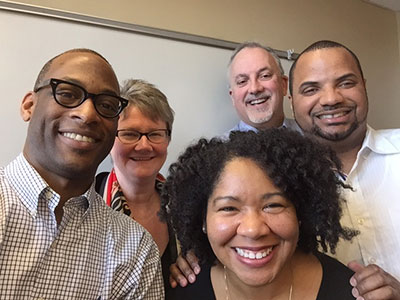
Denise Thorpe and team received a 2014 Collaborative Inquiry Team award for their project RACE, CHURCH AND THEOLOGICAL PRACTICES. The team includes: Denise E. Thorpe (Saint Ambrose Episcopal Church, Raleigh, North Carolina), J. Kameron Carter (Duke University, Durham, North Carolina), Donyelle Charlotte McCray (Virginia Theological Seminary, Alexandria, Virginia), Mark Ramsey (Grace Covenant Presbyterian Church, Asheville, North Carolina), and Jemonde Taylor (Saint Ambrose Episcopal Church, Raleigh, North Carolina).
LI: What was the process that led to the idea of Race, Church and Theological Practices for a Collaborative Inquiry Team?
DT: Our group developed organically. What we share in common is frustration with endless church and academic conversations about race that never seem to change the way we live together. Our work is focused on the “good people” reality: good people in church and academy talking and acting but never managing to disrupt deep social structures perpetuating racial regimes in and around us. We know we need to move to a different level of conversation and action if we want to understand the dynamics keeping things as they are. Time and trust are essential for that conversation.
Discussion around Jay Carter’s description of the church as trying to “love people into being just like us” galvanized our group. Each of us responded to Jay’s comment with illustrations and examples from our own experience in church and/or academy. Those varied experiences are the clear energy at the heart of our group.
LI: What surprised you about the group?
DT: We were all surprised by how quickly we came to trust one another. Two factors seem important. First, the make-up of the group. All of us have strong personalities. We are not afraid to speak. There are no banty roosters amongst us though. We are each there to listen as much as or more than to talk. Second, we’ve made a commitment to one another. We are sharing personal joys and challenges and praying for one another when we are apart.
In casual parlance the word “collaborative” can describe any effort to work on something with input from all involved. As a term of art “collaborative” has a more specific meaning: commitment to explore together and to resist moving to conclusions and action until every person is in agreement. Though not the right approach in every situation, we believe this form of collaboration is essential for our project. It takes time. Our imagination of our project started several years ago but we did not submit a grant application until 2013. Thus, we were circulating drafts at the same time our attention was riveted on the verdict and aftermath in the trial of George Zimmerman, the man who killed Trayvon Martin. Connections between our frustrations with the church and operations in our larger society were painfully clear. Those connections continue to drive our conversation.
LI: Tell us about your first meeting of the team.
DT: To quote one of us, our first meeting “blew my mind.” We started with case studies compiled from our own experiences. After typical “who I am and why I am here” introductions we dove into the case studies. In the midst of conversation one of the pastors turned to one of the scholars and said, “Now I see why I am in this group—I am almost the opposite of you in every way! I have so much to learn here.” Opposite may be a little strong, but the variety of experience and perspective definitely catalyze energy and imagination.
Other comments from our first meeting:
“It is difficult for me to think of another meeting that is comparable…The depth of our conversation was exponentially enhanced by having both pastors and professors. …I was presented with questions from all four people that I had not thought about before—three in particular stopped me in my tracks and required that I be silent for several beats and then think aloud toward an answer.”
“There are two things that I’d isolate as most important about our meeting. The first is the coming together of academics, practitioners, and persons who straddle the divide between academic and church practitioner, coupled with a spirit of deep collaboration, openness, and ultimately honesty and trust. The second is the sense of inquiry that I saw at play in our two meetings. …This was extraordinarily refreshing for me. …In some sense this group defies the distinction between academics and practitioners. My term for this group is Christian intellectuals. I see us as a group of Christian intellectuals trying to think toward a Christianity-to-come under the recognition that the Christianity that we’ve come to inherit of the mainline sort is under duress if not imminent collapse. The sign of its distress is manifest precisely at the site of the issue of race…”
We are on a journey together. We are deeply grateful to the Louisville Institute for making that journey possible.